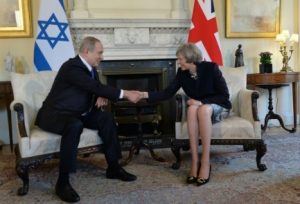
Visiting Great Britain, Israel’s PM Benjamin Netanyahu and British PM Theresa May discuss full range of regional and security issues.
• PM Netanyahu asks PM May to end British funding of radical anti-Israel NGOs.
• PM May invites PM Netanyahu to return to the UK and participate in upcoming Balfour Declaration centennial event.
By Shlomo Cesana
Prime Minister Benjamin Netanyahu met with British Prime Minister Theresa May for the first time in London on Monday, and the two leaders discussed three central topics: Iranian aggression, the Palestinian issue and the economy.
Netanyahu said he supports additional limitations on the Iranian nuclear deal’s expiration clause. As they stand now, the sanctions will automatically expire in 12 years. The additional limitations recommended by Netanyahu would mean that Iranian aggression would also invalidate the deal.

Prime Minister Benjamin Netanyahu meets with British Prime Minister Theresa May in London. – Photo: Kobi Gideon/GPO
Netanyahu said that he and May “see eye to eye on the grave danger that stems from Iran’s buildup and aggression, and its expansion into vast areas [in the Middle East], as well as consequences for Iran should its aggression continue. We also discussed what is transpiring in Syria, Hezbollah’s and the Iranian army’s involvement there. We agreed that it is important to stop this situation through a number of means.
“I told May that, in my opinion, [U.S. President Donald] Trump’s moves regarding additional sanctions on Iran should be supported. Every responsible country needs to support these kinds of steps. Even without a violation of the deal on their part, they [the Iranians] are on the path to the bomb.”
The two also discussed the stalled Israeli-Palestinian peace process.
“I made clear to the British prime minister what it [the two-state solution] entails,” Netanyahu said. “First of all, recognition of our national homeland. Even given this recognition, there is no situation in the foreseeable future in which Israel will not be the sovereign body and the only authority to control security west of Jordan.”
He denied this was a reversal of the support he voiced for the two-state solution in his Bar-Ilan University speech in 2009.
“I have not changed my position. I also voiced these limitations at Bar-Ilan,” he said. “These are fundamental conditions. I have no conditions for entering negotiations. These are the conditions for leaving negotiations and they are necessary contingencies.”
In a press briefing, Netanyahu said Washington had been updated in January on the plans for construction in Judea and Samaria. He said May had raised the topic in their meeting, but “we did not expand on the topic. It came up as is the custom, nothing beyond that.”
“I told May that the settlements are not an obstacle to peace,” Netanyahu said. “They [the Palestinians] do not recognize us there. We clear the territory, and it becomes a stronghold of Iran or Islamic State, or both, so we cannot enter an imagined reality. We talked about realistic as well as unrealistic things.”
According to May’s spokesman, she and Netanyahu discussed the Middle East conflict and Britain’s understanding that the two-state solution is the optimal solution for bringing stability to the region. The spokesman said May emphasized her opposition to settlements.
Netanyahu told reporters May had invited him to an event to mark the centennial of the Balfour Declaration in London in November.
“At the same time as the Palestinians want to sue Britain for the Balfour Declaration’s existence, it says something that the prime minister of Britain invited me to such an event,” he said.
Netanyahu also said he had submitted a request to halt Britain’s funding of controversial organizations such as Breaking the Silence.
The British government indirectly funds the activities of the controversial organization through its funding of organizations such as the Catholic Agency for Overseas Development and Christian Aid, which in turn transfer funds to Breaking the Silence and other radical leftist organizations.
On the economic front, Netanyahu said he and May discussed Britain’s decision to leave the EU and agreed to move toward a bilateral free trade agreement on issues such as technology, science and the cybersphere.
Before taking off for Tel Aviv, Netanyahu also met with British Foreign Secretary Boris Johnson.
View original Israel Hayom publication at:
http://www.israelhayom.com/site/newsletter_article.php?id=40177






 Israeli New Shekel Exchange Rate
Israeli New Shekel Exchange Rate